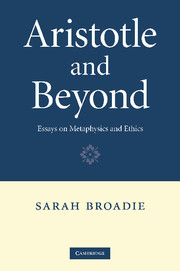Book contents
- Frontmatter
- Contents
- Preface
- Acknowledgments
- Chapter 1 Affecting and being affected
- Chapter 2 Backwards causation and continuing
- Chapter 3 From necessity to fate: An inevitable step?
- Chapter 4 Alternative world-histories
- Chapter 5 A contemporary look at Aristotle's changing Now
- Chapter 6 Nature and craft in Aristotelian teleology
- Chapter 7 Soul and body in Plato and Descartes
- Chapter 8 Aristotle and contemporary ethics
- Chapter 9 On the idea of the summum bonum
- Chapter 10 What should we mean by ‘the highest good’?
- Chapter 11 The good of practical beings: Aristotelian perspectives
- Chapter 12 Taking stock of leisure
- References
- Index of names
Chapter 4 - Alternative world-histories
Published online by Cambridge University Press: 25 June 2009
- Frontmatter
- Contents
- Preface
- Acknowledgments
- Chapter 1 Affecting and being affected
- Chapter 2 Backwards causation and continuing
- Chapter 3 From necessity to fate: An inevitable step?
- Chapter 4 Alternative world-histories
- Chapter 5 A contemporary look at Aristotle's changing Now
- Chapter 6 Nature and craft in Aristotelian teleology
- Chapter 7 Soul and body in Plato and Descartes
- Chapter 8 Aristotle and contemporary ethics
- Chapter 9 On the idea of the summum bonum
- Chapter 10 What should we mean by ‘the highest good’?
- Chapter 11 The good of practical beings: Aristotelian perspectives
- Chapter 12 Taking stock of leisure
- References
- Index of names
Summary
There is a more pressing difficulty for determinism than the celebrated one to do with ascribing moral responsibility. It arises because we assume that events and actions usually make a difference to the world where they take place, and that we, at least in the short term, can often tell what the differences are. This double assumption, partly about the effects of actions and events, partly about our knowledge of them, seems threatened by determinism. I shall say presently why, but first a word on the greater urgency of this difficulty by comparison with the other, and more extensively discussed, problem to do with moral responsibility.
Moral responsibility presupposes agency, and agents act to make a difference, whether to themselves, to their environment, or to others. Perhaps there are cases where we reasonably hold someone responsible although her action, and even her choice of action, made no difference since the relevant effect was going to come about anyway independently. But I think such cases are possible only if the agent acts without realising that things are set up in such a way that her action makes the relevant effect not even the slightest bit more likely than it would have been without it. One cannot act with the purpose of making some desired thing happen if one is assured that acting so would be completely ineffectual in that respect. We may, in such a case, welcome the occurrence of what was willy-nilly going to happen.
- Type
- Chapter
- Information
- Aristotle and BeyondEssays on Metaphysics and Ethics, pp. 50 - 71Publisher: Cambridge University PressPrint publication year: 2007
- 1
- Cited by



